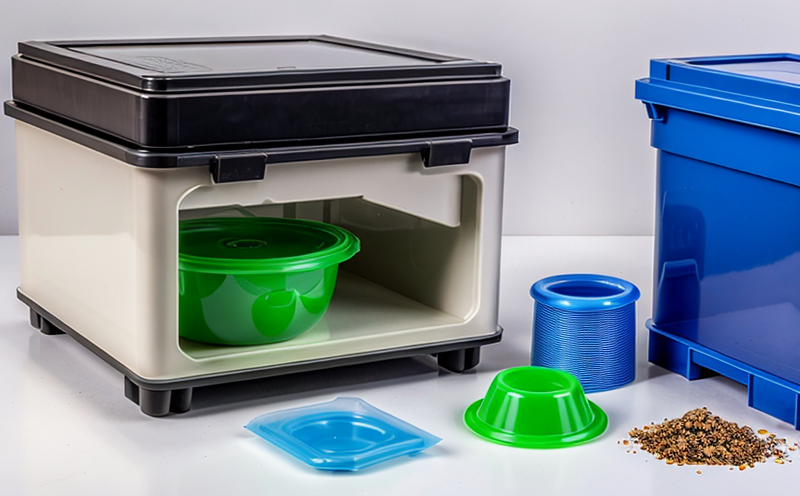FDA 21 CFR 177 Plastics Food Contact Compliance Testing
The FDA’s 21 CFR Part 177 outlines the safe use of plastics in food contact applications, ensuring that materials do not contaminate food with harmful substances during processing, packaging, or storage. This testing service is essential for manufacturers who produce plastic components intended to come into direct contact with food products.
The FDA’s regulations are stringent and require thorough compliance checks before any material can be used in a food-contact application. Failure to meet these standards can result in product recalls, legal action, and damage to brand reputation. Our laboratory offers comprehensive testing services that ensure your packaging materials comply fully with the 21 CFR Part 177 requirements.
Our team of experts uses state-of-the-art equipment and follows internationally recognized methods to assess whether plastic components used for food contact applications are safe. This includes evaluating chemical migration into food, assessing thermal stability, mechanical properties, and more. We provide detailed reports that help you understand the performance and safety profile of your materials.
The testing process involves several key steps:
- Initial consultation to determine specific requirements
- Specimen preparation according to FDA guidelines
- Testing using appropriate methods such as ISO 16993:2019, ASTM E96, and others
- Data analysis and report generation
Our service is tailored to help you navigate the complexities of FDA regulations. We provide detailed insights into how your materials perform under various conditions, ensuring they meet all necessary criteria for safe use in food-contact applications.
| Test Parameter | Description |
|---|---|
| Chemical Migration | Evaluation of leachable chemicals into food simulants |
| Thermal Stability | Determination of material stability at elevated temperatures |
| Mechanical Properties | Assessment of tensile strength, impact resistance, etc. |
| Hydrolytic Degradation | Evaluation of chemical breakdown in water |
| Microbial Growth Inhibition | Determination of antimicrobial efficacy if applicable |
We also offer assistance with regulatory compliance, ensuring that your materials meet all necessary standards and requirements. This service is invaluable for quality managers, compliance officers, R&D engineers, and procurement teams who need to ensure their products are safe and compliant.
Our testing services provide you with the confidence needed to bring your product to market safely and efficiently. Contact us today to learn more about how we can help you meet FDA 21 CFR Part 177 requirements for plastics used in food contact applications.
Applied Standards
The FDA’s 21 CFR Part 177 specifies the safe use of certain plastics in food-contact applications, and our laboratory adheres to these regulations when performing FDA 21 CFR 177 compliance testing.
We also follow international standards such as ISO 16993:2019, which provides a framework for the evaluation of medical devices, and ASTM E96, used to measure water vapor permeability. These standards ensure that our testing methods are consistent with industry best practices.
Our team of experts ensures that all tests are conducted in accordance with these guidelines, providing you with reliable data and reports that meet regulatory requirements. By adhering strictly to the FDA’s regulations and international standards, we help manufacturers produce safe and compliant packaging materials for food contact applications.
Scope and Methodology
The scope of our FDA 21 CFR 177 plastics food contact compliance testing is broad, covering a range of tests designed to ensure that plastic components used in food-contact applications are safe. This includes evaluating the migration of chemicals from the packaging into the food, assessing thermal stability, mechanical properties, and more.
| Test Parameter | Description |
|---|---|
| Chemical Migration | Evaluation of leachable chemicals into food simulants |
| Thermal Stability | Determination of material stability at elevated temperatures |
| Mechanical Properties | Assessment of tensile strength, impact resistance, etc. |
| Hydrolytic Degradation | Evaluation of chemical breakdown in water |
| Microbial Growth Inhibition | Determination of antimicrobial efficacy if applicable |
The methodology involves several key steps:
- Initial consultation to determine specific requirements
- Specimen preparation according to FDA guidelines
- Testing using appropriate methods such as ISO 16993:2019, ASTM E96, and others
- Data analysis and report generation
We use advanced instrumentation and techniques to ensure accurate and reliable results. Our team of experts ensures that all tests are conducted in accordance with the FDA’s regulations and international standards.
Customer Impact and Satisfaction
The impact of our FDA 21 CFR 177 compliance testing service on customers is significant. By ensuring that your packaging materials meet all necessary criteria for safe use in food-contact applications, we help you avoid costly recalls and legal issues. This can save time and resources, allowing you to focus on other aspects of your business.
Our transparent reporting process ensures that you have a clear understanding of the performance and safety profile of your materials. This helps you make informed decisions about material selection and production processes.
We also offer ongoing support to help you stay compliant with changing regulations. Our team can assist you in navigating the complexities of FDA requirements, ensuring that your products are always safe for use in food-contact applications.
Customer satisfaction is a priority for us, and we strive to provide services that meet or exceed your expectations. Whether you are a quality manager, compliance officer, R&D engineer, or procurement professional, our expertise and commitment to excellence will help you achieve your goals.





